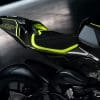The adventure motorcycle market is booming with many models featuring hi-tech ABS and traction control for various types of surface.
But BMW Motorrad wants to up the ante on this technology with an automatic system that scans the road surface and automatically adjusts the ABS and traction control to suit the level of traction.
The German company has filed a patent for the system which uses a combination of cameras and microphones to scan the road surface.
The camera system “photographs” the surface and compares it with a bank of stored images to determine the traction level differences between gravel, loam, tarmac, sand, etc.
It also “listens” to the sound of the tyres on the road. Obviously, there is a difference in sound between these surfaces. I suspect the camera predicts the road surface and the audio feedback confirms it.
So, when it detects the change in surface traction level, it automatically adjusts the traction control and ABS to suit.
While some riders might welcome such techno advances as a safety feature, there would be many skeptics who might be worried about such interventionist technology.
Here’s an example:
In Queensland, slippery clay is a reddish-orange colour. It’s easy to spot and you adjust your riding style and perhaps select a bit more traction control when you see it on the road ahead.
Several years ago I was riding through the forests of the Victorian Yarra Ranges of Victoria on the press launch of the BMW R 1200 GS with the twin-cam engine.
The road surface and colour seemed to change every minute and most of it was a reddish colour.
When I spotted a bend up ahead with a grey colour, I didn’t slow as much as I should have as it looked like hard-pack gravel. I planned to back the bike in under rear brake and then power-slide it out of the corner.
However, as I entered the bend the front slid out from underneath me and I realised too late that Victorian clay is grey, not red! The bike went down on one cylinder head and slid sideways, speedway-style.
Somehow I managed to keep it going through the corner without spitting me off.
Now, I wonder if human knowledge of local terrain would be better or worse than a bank of stored computer images of road surfaces!



